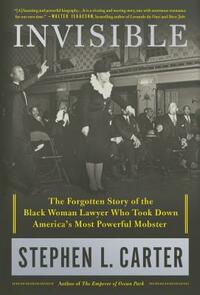Take a photo of a barcode or cover
92 reviews for:
Invisible: The Forgotten Story of the Black Woman Lawyer Who Took Down America's Most Powerful Mobster
Stephen L. Carter
92 reviews for:
Invisible: The Forgotten Story of the Black Woman Lawyer Who Took Down America's Most Powerful Mobster
Stephen L. Carter
informative
inspiring
reflective
slow-paced
This biography follows Eunice Hunton Carter, the author's grandmother, in the ups and downs of her career. Carter does well in mixing the historical context with the life she was living. As a black female attorney, it was insightful to see how much things have stayed the same. Black attorneys still make up around 5% of the attorneys in the US and it is very likely to be the only one in the room. I think Carter did an excellent job exploring who his grandmother was and highlighting the joy and pains of ambition. Eunice Carter failed in some aspects but when she did succeed she has blazed a trail. My only complaint is that sometimes the author went too much into detail when it was necessary and I wish it had more details on the case that the tagline talks about. I was fascinated with the mob case and the author just didn't go into great detail about her role.
How disappointing to read a terrible book by a competent author. Carter’s overlong, badly edited history of his unpleasant grandmother is an uneasy mix of family memoir, awkward social commentary, and ham handed potboiler. Purporting in the breathless subtitle, to tell “the forgotten story of the Black woman lawyer who took down America's most powerful mobster” Carter’s account of the Lucky Luciano case takes up a mere 44 of the books 384 pages, and exaggerates her role; while Eunice Carter did conceive of the strategy for indicting Luciano , she did not prosecute the case, and the claim that “without her work the Mafia boss never would have been convicted” is a stretch.
Carter lards the narrative with unwieldy prose worthy of a dime store novel, ending chapters with clunky cliff hangers (“Or so she thought” “To no avail” “It sounded so simple. It was anything but”) and incessant, irritating references to “the darker nation”, “sassiety” and “the slippery slides of the Great Social Pyramid”. Ugh.
But the true weakness of the book is that Eunice is its least interesting character. Carter blames her many failures on her left wing brother Alphaeus, whose unpardonable crimes include organizing black voter registration drives and attacking the Republican party. There is a fascinating story to be told here about midcentury African American political divisions, and about Alphaeus’ role fighting racism and McCarthyism alongside Paul Robeson, Mary Mcleod Bethune, and W.E.B. Dubois. One hopes Carter’s next book will explore that story.
Carter lards the narrative with unwieldy prose worthy of a dime store novel, ending chapters with clunky cliff hangers (“Or so she thought” “To no avail” “It sounded so simple. It was anything but”) and incessant, irritating references to “the darker nation”, “sassiety” and “the slippery slides of the Great Social Pyramid”. Ugh.
But the true weakness of the book is that Eunice is its least interesting character. Carter blames her many failures on her left wing brother Alphaeus, whose unpardonable crimes include organizing black voter registration drives and attacking the Republican party. There is a fascinating story to be told here about midcentury African American political divisions, and about Alphaeus’ role fighting racism and McCarthyism alongside Paul Robeson, Mary Mcleod Bethune, and W.E.B. Dubois. One hopes Carter’s next book will explore that story.
informative
slow-paced
challenging
informative
slow-paced
nobody could have written this biography than Eunice’s grandson better as it feels incredibly intimate and loving.
This book gives a unique story set up in Harlem at a time most believed higher offices to be entirely segregated and closed for women. It is refreshing to learn about the Black elite and how Eunice navigated her era, making us nearly forget all the prejudice she might have had encountered. I really enjoyed her take down of the New York mob (i strongly recommend watching the godfather II before reading the book !), but it is not as present in the book as the subtitle of would suggest.
I really enjoyed the epilogue, it made me want to read more of Carter’s non-fiction. I’d really like him to write about discrimination in some form of formal essay or letters !!
This book gives a unique story set up in Harlem at a time most believed higher offices to be entirely segregated and closed for women. It is refreshing to learn about the Black elite and how Eunice navigated her era, making us nearly forget all the prejudice she might have had encountered. I really enjoyed her take down of the New York mob (i strongly recommend watching the godfather II before reading the book !), but it is not as present in the book as the subtitle of would suggest.
I really enjoyed the epilogue, it made me want to read more of Carter’s non-fiction. I’d really like him to write about discrimination in some form of formal essay or letters !!
I hate to say this, but this read was so disappointing. This was more of a biography for Eunice Carter (the author’s grandmother) which is great, but that’s not what I signed up for. The title is so misleading! You read the title thinking, “Wow! Why haven’t I heard of this lady? I love mob stories and true crime!” (Don’t pretend you don’t!!)
Carter starts this all off my mentioning the portrayal of Eunice Carter in HBO’s Boardwalk Empire and how the role was small but garnered so much skepticism and feedback from viewers. I honestly felt as though this book would have been the vehicle to get the entire story out there. We dig into the book and there are only about 20 pages that deal with Lucky Luciano.
In general, I’d give this 3.5 stars based on Black History, but because I went in looking for something specific that I didn’t find I’m giving it 2 stars.
Carter starts this all off my mentioning the portrayal of Eunice Carter in HBO’s Boardwalk Empire and how the role was small but garnered so much skepticism and feedback from viewers. I honestly felt as though this book would have been the vehicle to get the entire story out there. We dig into the book and there are only about 20 pages that deal with Lucky Luciano.
In general, I’d give this 3.5 stars based on Black History, but because I went in looking for something specific that I didn’t find I’m giving it 2 stars.
informative
informative
lighthearted
reflective
sad
slow-paced
A few weeks ago, I had the pleasure of hearing at a local bookstore the author Stephen L. Carter speak about his paternal grandmother Eunice Huston Carter (1899-1970). Sometime later, after the Q&A session, I had the opportunity to speak with Professor Carter as he autographed my copy of this book.
"INVISIBLE: The Forgotten Story of the Black Woman Lawyer Who Took Down America's Most Powerful Mobster" puts the reader into an era in U.S. history barely half a century behind us, when African Americans were restricted by law and what was accepted custom from realizing their full potential in what was an overtly racist America (Jim Crow segregation). Notwithstanding all that, what I found to be deeply inspirational from reading this book is learning about the life of this most remarkable woman - as well as the lives of her parents (who were both fully engaged social activists; Eunice's father with the YMCA (its 'colored' section) for whom he worked tirelessly both in the U.S. and abroad til his death in 1916 and her mother Addie was a graduate of Boston Latin School, and a college graduate who later served as a teacher and worked with a variety of organizations promoting racial and gender equality til her death in 1943) and younger brother, from whom she became estranged.
This is a book that would be instructive (as well as inspirational) to any reader who wants to learn about the value of living -- in spite of the obstacles and challenges arrayed against someone because of their color and/or gender -- a purposeful, committed life wholly dedicated to advancing socio-economic justice, as well as racial and gender equality.
"INVISIBLE: The Forgotten Story of the Black Woman Lawyer Who Took Down America's Most Powerful Mobster" puts the reader into an era in U.S. history barely half a century behind us, when African Americans were restricted by law and what was accepted custom from realizing their full potential in what was an overtly racist America (Jim Crow segregation). Notwithstanding all that, what I found to be deeply inspirational from reading this book is learning about the life of this most remarkable woman - as well as the lives of her parents (who were both fully engaged social activists; Eunice's father with the YMCA (its 'colored' section) for whom he worked tirelessly both in the U.S. and abroad til his death in 1916 and her mother Addie was a graduate of Boston Latin School, and a college graduate who later served as a teacher and worked with a variety of organizations promoting racial and gender equality til her death in 1943) and younger brother, from whom she became estranged.
This is a book that would be instructive (as well as inspirational) to any reader who wants to learn about the value of living -- in spite of the obstacles and challenges arrayed against someone because of their color and/or gender -- a purposeful, committed life wholly dedicated to advancing socio-economic justice, as well as racial and gender equality.







